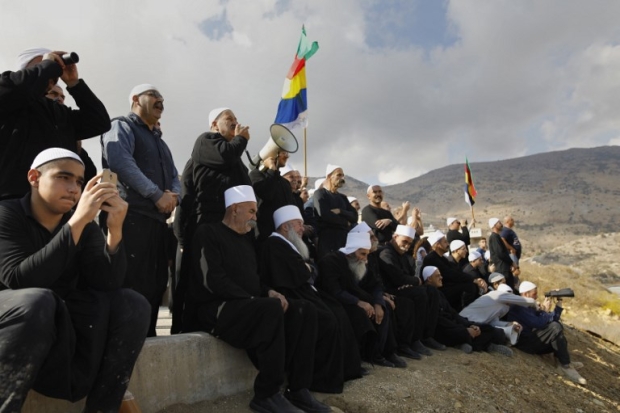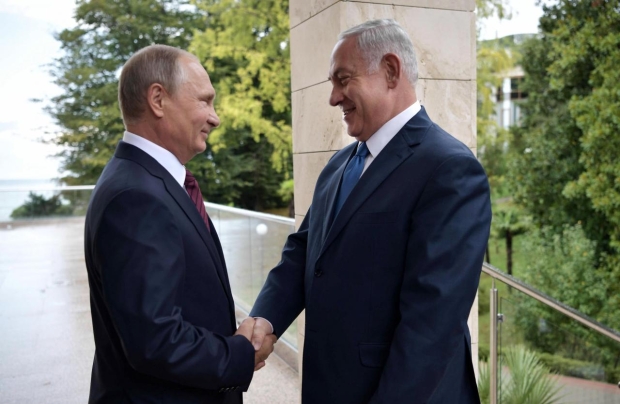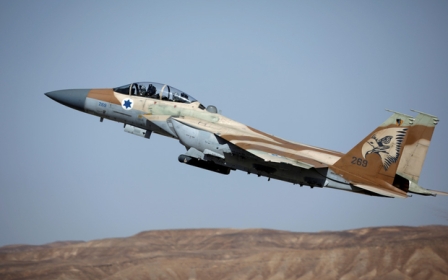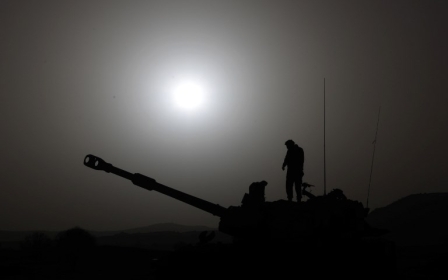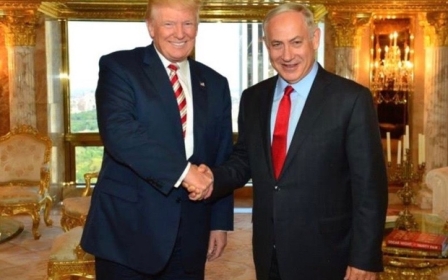Confronting Iran: Israel's new war front in Syria
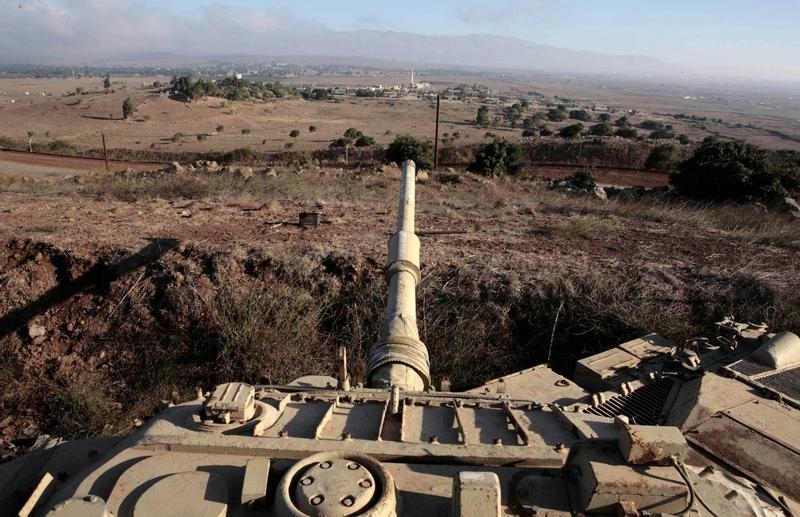
According to Syrian media – government and opposition alike – the Israeli Air Force (IAF) struck military targets in Syria three, probably four times in the last week. As is normal in such cases, Israel keeps silent, neither confirms nor denies.
Among the targets attacked was a Syrian military camp in Ein Kiswah, 13 kilometers south of Damascus and 40 kilometers to the Israeli border on the Golan Heights. According to Israeli sources, the camp is built to house in the future 5000 troops from Iran and or its international Shia militia.
Major-General Amir Eshel recently boasted in interviews with Israeli media outlets that IAF planes attacked 100 times since the civil war broke out in Syria nearly seven years ago
The number of strikes and the quality of targets in one week is exceptional even in the history of Israeli military involvement in Syria. The former air force commander, Major-General Amir Eshel recently boasted in interviews with Israeli media outlets that IAF planes have attacked 100 times since the civil war broke out in Syria nearly seven years ago.
Red lines
Last week's strikes are a sign that Israel has extended its "red-lines" in Syria, which are reflecting what it perceives as its essential national security interests. All in all one can count eight red lines.
It began with one clear red line: a policy of non-intervention in the civil war. "It's none of our business," said all three the Israeli defence ministers – Ehud Barak, Moshe Yaalon and Avigdor Liberman – who have served in office since 2011. Later, as the Syrian conflict intensified, Israel added two more red lines. The first one was and still is to maintain peace and tranquility along the border.
The second is to respond in measure to any fire, usually erred, as a spillover of the clashes between the Syrian army and the rebel groups. The Israeli retaliation was mostly directed against Syrian army position arguing that Israel holds the Bashar Assad regime responsible since he is the sovereign of the state.
Then another line was drawn. Iran's al-Quds force led by the legendary General Qassem Soleimani planned together with Hezbollah to create cells of sleepers agents along the Israeli border on the Golan Heights. They consisted of local Syrian Druze and Palestinians who belonged to the remnants of the Popular Front for the Liberation of Palestine (PFLP) General Command founded nearly 50 years ago.
The purpose was to activate these guerrilla cells (Israel defined them as terror infrastructure) in case of clashes between Israel and Hezbollah in Lebanon and thus to challenge Israel militarily and simultaneously on two fronts. The cells were involved in a few attacks against Israeli patrols along the border and launched rockets.
Assassinations
But as reported, within a few months, and based on precise intelligence the IDF disrupted their plans. Using drones and airplanes Israel killed the cells' leaders including, in January 2015, Jihad Mughniyeh, the son of Imad, who was the military commander of Hezbollah and who also had been killed, according to US media reports, in a joint assassination operation carried out by Mossad and the CIA.
In the course of the Israeli actions against the cells an Iranian IRGC general was also killed by mistake when he was traveling with Jihad Mughniyeh. In this way Israel managed to crush the Iranian-Hezbollah plan.
Taking advantage of the chaos and the fact that so many foreign forces and states were operating on Syrian soil and air, Israel also joined the fray. It occasionally sent its air force to attack weapons storage and convoys supplying precision missiles from Iran and Syria to Hezbollah.
If a new war breaks out with Hezbollah – the last one between the two sides was 11 and half years ago – Israel is not only concerned about the quantity of missiles that Hezbollah now possesses - it would launch tens of thousands of missiles and rockets of all ranges against urban and strategic targets – but also the quality and accuracy of its missiles.
Israel also established another "must" which in fact is a "must not". In essence it is a strong message to the various rebel groups and especially the former Syrian branch of al Qaida now known as Jabhat Fatah a-Sham (JFS) – don't attack the Syrian Druze, certainly those who live close to the Israel border.
This red line was forced upon the Israeli military by the Israeli Druze community whose members serve in the IDF and are considered to be loyal to the Jewish state but also feel affinity to their brethren across the border.
The Israeli message, backed by military threats, was well received. Thus, adding another irony to the complex Syrian conflict: the Syrian Druze are loyal to the Assad regime and hostile to Israel but are defended by both.
Keeping Russia sweet
Two and half years ago Russia deployed thousands of its troops in Syria and sent dozens of its fighter planes and bombers to rescue the Assad regime which was at that moment on the verge of total collapse. It worked. The Russian president saved his Syrian counterpart and ally.
With this background, Israel had to draw another line - maybe the most important of all: to avoid at all cost military confrontations and clashes with Russia in Syria. To achieve it, Israeli Prime Minister Benjamin Netanyahu invested a lot of time and energy in building up relations with Vladimir Putin. He flew to Moscow and met Putin six times, more than any other leader in the world over such a short period.
Israel will not allow an Iranian presence or its emissaries in a strip of at least 40 kilometers from its border and will not tolerate Iranian permanent military camps
Netanyahu and Putin established special communication channels between the top echelon of the two armies and most importantly the air-forces and their air defence systems. Through these channels the two sides "deconflict", exchange information and operational coordination and maybe even have tacit understandings to not intervene in each other's business.
In the meantime, with the collapse of Islamic State and relative stabilisation of the regime, a new reality is emerging in Syria. Iran with its thousands troops and tens of thousands allies – Hezbollah and the international Shia militia – continues with its aspiration for regional hegemony.
Tehran doesn't want the spilling of the blood of its soldiers and of those of its allies to be in vain. They are looking for war dividends in the shape of deepening their involvement and influence in Syria. Syria is a key link in its chain to create a "Shia crescent" from Iran via Iraq, Syria to Lebanon and a foothold in the Mediterranean. For this purpose Iran needs military bases, airfields and seaports in Syria.
Iran's new front
Iranian attempts to consolidate its involvement in Syria pushed Israel to recently add more red lines. They are emphasised in statements by Netanyahu, Defence Minister Avigdor Liberman and the Chief of staff, Lt-General Gadi Eisenkot.
They repeatedly say that Israel will not allow an Iranian presence or its emissaries in a strip of at least 40 kilometers from its border and will not tolerate Iranian permanent military camps as well as air, sea and intelligence bases on Syrian soil.
Israel can keep doing it as long as Russia is turning a blind eye.
To enforce its statements, make its position clear and to show that it is serious, Israel launched its recent attacks. Clearly, Israel can keep doing it as long as Russia is turning a blind eye. It happens, most probably, because Russia understands Israeli's vital national security interests. The end result is that Russia is playing a double game, and could even be defined as a double-crosser. It is helping to defend the Syria regime but also looking the other way when Israel weakens it.
Surely Russia, Assad and Iran know very well that Israel has the military power to "ruin the party" and prevent Assad ending the civil war and stabilising the country.
As long as Russia doesn't say "nyet" and "no more", Israel will feel it has a free hand to impose its red lines. But there is a caveat here.
It regards Iran. Iran is a different story. The country has its long-term strategic aims and it won't give them up easily. If and when Iran realises that Israeli actions are endangering its interests and hitting its national pride it may well have to retaliate against Israel in one way or another.
- Yossi Melman is an Israeli security and intelligence commentator and co-author of Spies Against Armageddon.
The views expressed in this article belong to the author and do not necessarily reflect the editorial policy of Middle East Eye.
Photo: An Israeli tank deployed in the Israeli occupied Golan Heights facing Syria. (AFP)
This article is available in French on Middle East Eye French edition.
New MEE newsletter: Jerusalem Dispatch
Sign up to get the latest insights and analysis on Israel-Palestine, alongside Turkey Unpacked and other MEE newsletters
Middle East Eye delivers independent and unrivalled coverage and analysis of the Middle East, North Africa and beyond. To learn more about republishing this content and the associated fees, please fill out this form. More about MEE can be found here.



